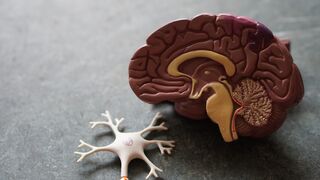Diet
When It Comes to Weight Loss, It’s Not Just Psychological
Using neuroscience to explain why diet industry programs fail.
Posted January 11, 2022 Reviewed by Vanessa Lancaster
Key points
- Set-point theory suggests that each person has a predetermined weight where their body functions optimally.
- Our bodies adjust their regulatory systems to keep us at our set-points.
- Our body weights are not necessarily indicative of our health statuses.
Though more people acknowledge that the diet industry is misleading, weight loss programs still assure us that eating certain prepackaged meals and counting calories will lead to weight loss.
These claims, however, overlook two important complexities:
- Different bodies function best at different weights.
- Our unique regulatory systems fight to keep us at these weights for peak performance.
Set-Point Theory
Set-point theory suggests that each person has a biologically, predetermined weight (a “set-point”) where their body operates best.1 Consequently, each person's body works to keep them at their set-point by tweaking various biological systems; this helps regulate how much food a person eats and the amount of energy they expend accordingly.

Set-point theory helps explain why many people, over time, regain the weight that they’ve lost. It also clarifies why people with eating disorders aren’t always severely underweight: our bodies fight to keep us at or above our weight set-points.
Nonetheless, there is still so much we don’t know about how our bodies regulate weight.
The Hormone Leptin
One hormone that has gained recent attention for its involvement in weight maintenance is leptin. Leptin exists in fat cells and is released in response to energy balance and fat mass changes.1
Once released, leptin tells the hypothalamus (our brain’s “eating control center”) about these changes; the hypothalamus then assists with adjusting regulatory signals (i.e., fullness cues) that contribute to resetting our fat and energy levels.

It is thought that people at unhealthy, high weights might be leptin resistant. This could result in them not receiving fullness cues when their bodies have sufficient energy.2
Nonetheless, weight regulation is not that simple.
First, the orchestration of how our bodies regulate weight is very intricate and complex. For example, research suggests that leptin doesn't simply stop us from eating too much.1 Rather, it might be skewed to protect our bodies from losing, rather than gaining, fat. In other words, leptin's primary job might be to keep us from falling below our set-point, with less regard for weight gain.
This could be one reason why (biologically speaking) it’s easier for people to gain, not lose, weight.
Second, weight regulation involves many different factors besides biology, including, but not limited to, genetics, culture, and psychology. Each of these must be considered when discussing a person's weight.
Psychology: An Updated Diet Industry
One recent diet program has capitalized on increasing acknowledgement that psychology contributes to weight maintenance.
Specifically, this program (which claims to not be a diet) stresses that, by using psychology, it can “help you lose the weight for good.” It claims that this approach works because “when it comes to weight loss, it’s psychological.”

If this seems overly simplistic, that's because it is.
While it has been demonstrated that psychological interventions (e.g., cognitive behavioral therapy or CBT) can contribute to short-term weight loss, it’s unclear if psychological interventions alone can help individuals stay at a lower weight long-term.3
This is partially due to biology, and partially due to the challenges of changing our health behaviors.
The Brain and Health Behavior Change
The aforementioned diet program claims that "psychology" can change the “conditioned" thoughts people have had since childhood, such as cleaning one’s plate during a meal or eating while watching television.
On the surface, this seems like a good approach. In fact, research has shown that our brains and our experiences bidirectionally influence one another.3 This means that our experiences (i.e., our eating habits or thoughts about food) can alter our brains' structure. It also means that we have the potential to “rewire” our brains using thought and behavior change.3 This approach has proven effective in treating many psychological disorders, including anxiety, depression, and eating disorders.3
Nonetheless, altering how our brains function with behavior change isn’t easy.

First, an individual needs to practice the desired behavior or thought over and over, in different environments, for a prolonged period. This is necessary for lasting, altered brain function and subsequent behavioral and emotional changes.3
Second, how the person feels while doing the new behavior influences the brain’s susceptibility to change (i.e., plasticity). For example, the brain lacks the proper energy to focus on habitual behavior and/or thought change if someone is bored. At the other extreme, a highly aroused or frightened person won’t have the adequate brain or body chemistry for efficient learning.
Finally, lasting brain changes depend on our brain cells' size, their configuration and arrangement, and their connections with other local and distant cells.
Because these factors vary between people, health behavior change will come much easier for some than others.
Consequently, while it is true that psychology can contribute to lasting behavior changes, it is misleading to say that “psychology” alone can help us “finally lose the weight for good " by changing our “conditioned behaviors”.
Conclusions
The U.S. weight-loss industry, which includes, but isn’t limited to, diet food/drinks and pills, diet chains, marketed diet plans, and health clubs, is worth well over 70 billion US dollars a year.4

Such monetary gains come at the expense of its consumers, who are marketed easy weight loss solutions without a thorough explanation of how complex weight regulation is.
Consequently, the purpose of this post is to inform people that sustained weight loss is a complicated process that cannot (and should not) be attempted through diet industry tricks. Instead, it’s always best to consult specialists (e.g., dietitians; endocrinologists) and use a variety of safe approaches when considering weight loss.5
It’s also crucial to listen to and appreciate our bodies at any weight and accept that our health and happiness are important and valid. Because we are individuals with unique biological systems, our weights are not necessarily representative of our health status.
References
1) Müller, M., Bosy-Westphal, A., & Heymsfield, S. (2010). Is there evidence for a set point that regulates human body weight? F1000Reports, 2.
2) Klok, M., Jakobsdottir, S., & Drent, M. (2006). The role of leptin and ghrelin in the regulation of food intake and body weight in humans: A review. Obesity Reviews, 8, 21-34.
3) Wasserman, T., & Wasserman, L. (2019). Neural plasticity and its implications for therapy. Therapy and the Neural Network Model, pp. 45-57.
4) U.S. Weight loss & diet control market report 2021: Market reached a record $78 billion in 2019. Yahoo. Retrieved from: https://www.yahoo.com/now/u-weight-loss-diet-control-092000673.html
5) Gianluca, C., et al. (2017). Cognitive behavioral therapy to aid weight loss in obese patients: Current perspectives. Psychology Research and Behavior Management, 10, 165-173.




